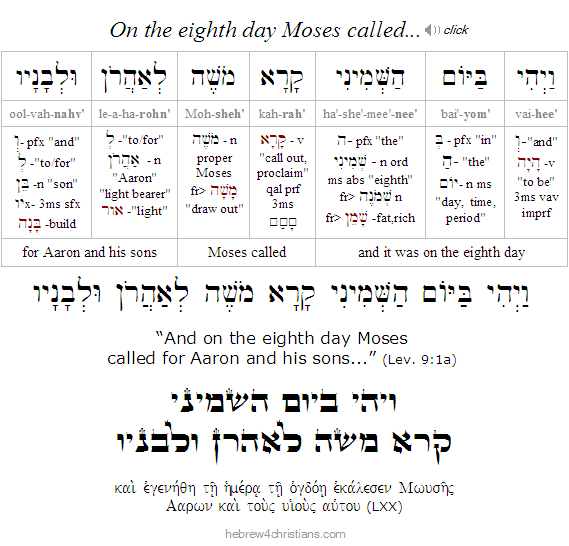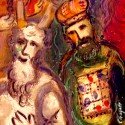|
|
 |
 |
 |
 |
|
Weekly Torah Reading
|
|
|
|
Parashat Shemini ("Eighth")
|
|
|
Click on the links to display the Scriptures:
|
|
|
|
 |
 |
 |
|
Torah Reading Overview
|
|
|
|
This portion begins on the eighth (shmini) day following the seven days of ordination (yemei ha-milu'im) of the Mishkan (Tabernacle). On each of the previous seven days Moses had gathered the Israelites to watch him assemble the Mishkan and to ordain Aaron and his sons for service, anointing them with oil mixed with the blood of a male lamb (eil ha-milu'im - the "ram of ordination"). Moses repeated this process seven times to teach the priests how they would minister in the new Sanctuary.
|
|
|
 |
 |
|
The eighth day of the ordination, however, was Rosh Chodesh Nisan, and God commanded Moses to have Aaron (and his sons) to directly offer the sacrifices (instead of Moses) and to officially assume their responsibilities on behalf of the people.
The parashah begins:
|
 |
 |
|
On the eighth day Moses called Aaron and his sons and the elders of Israel (Leviticus 9:1)
|
 |
 |
|
Jewish tradition states that the elders mentioned here are the same shivim zekanim (70 elders) who accompanied Moses and Aaron (and his sons Nadav and Avihu) upon Mount Sinai to eat a "covenant affirmation meal" between klal Yisrael and the LORD (see parashat Mishpatim for details). Later tradition maintained that the 70 elders formed the basis for the 70 judges of the Sanhedrin, the highest legal court of Israel.
Moses called Aaron, his sons, and the elders and told them to get special sacrifices for the mishkan ready, since haiyom Adonai nirah eleikhem - "today the LORD will appear to you."
Moses explained that kevod Adonai - the glory of the LORD - would appear before Israel after Aaron offered chatat (a sin offering for the Golden Calf) and olah (an ascending smoke offering that would recall the sacrifice of Isaac by Abraham). The very first sacrifice of the Mishkan, then, was a sin offering for Aaron intended for expiation for the sin of the idolatry. Thus the Torah reads, "Take for yourself a bull calf" (קַח־לְךָ עֵגֶל בֶּן־בָּקָר) for a sin offering (Lev. 9:2). Notice that this offering was made together with the whole burnt offering of the lamb, to recall the sacrifice of Isaac (i.e., the Akedah) and to foreshadow the coming of Yeshua, the great Lamb of God.
Both of these offerings were to be personally made by Aaron. In addition, korbanot was to be offered on behalf of the people: a goat offering (to silence satan for their sin with the Golden Calf), a calf offering as olah (as a symbol of the Golden Calf), a lamb offering olah (to again represent Isaac who was "led like a lamb to the slaughter" upon the altar at Moriah), and shelamim (peace) and minchah (meal) offerings (see last week's parashah for details).
The people gathered at the mishkan and Aaron offered the sacrifices in accordance with the rituals that Moses had shown him during the previous seven days. However, there was no holy fire (Shekhinah) from heaven that consumed the sacrifices, and therefore everyone was concerned that they had not been forgiven of the sin of the Golden Calf and that the LORD would not dwell among them as their God.
Moses and Aaron then went into the mishkan and interceded on behalf of Israel, and when they came out and blessed the people, the glory of the LORD appeared and the holy fire consumed the offerings on the altar. When all the people saw it, they rejoiced and shouted and fell on their faces.
(Jewish tradition considers the day that the Torah was given to Moses as an engagement of a chassan (bridegroom) and a kallah (bride). On this first anniversary of Rosh Chodesh Nisan, the Shekhinah glory came to abide among Israel, and is likened to a wedding day.
Aaron's Sons: Nadav and Avihu
|
 |
 |
|
Aaron's two oldest sons, Nadav (Nadab) and Avihu (Abihu) were considered two of the greatest of the Israelites (next to Moses and Aaron), and were even considered greater than the shivim zekanim (70 elders) who accompanied Moses and Aaron upon Mount Sinai to ratify the giving of the sefer ha'brit, the giving of the Law to Israel.
|
|
|
 |
 |
|
In the midst of the Tabernacle dedication celebration, however, tragedy struck as they took it upon themselves to offer their own korban in the Holy of Holies of the mishkan. According to Jewish tradition, they reasoned that ketoret (incense) was the holiest of offerings, and since the kodesh hakodashim (the Holy of Holies) was the holiest place, they would offer their gift to the LORD there.
|
|
 |
 |
|
Apparently they further reasoned that the laws of sacrifice given for Yom Kippur were the same as those given at this dedication, and since Yom Kippur required the presentation of incense within the Holy of Holies, they decided this was the right thing to do on this occasion as well.
However, since this was not the prescribed means of offering sacrifice, the LORD considered the incense offered to be "strange fire" (esh zarah) and they were both consumed before the LORD (Jewish tradition claims they were burned "from the inside out" and their corpses were carried by an angel outside of the Holy of Holies). Moses' cousins (Mishael and Eltzafan) were told to take their bodies outside the camp to be buried. Aaron and his remaining sons were not allowed to leave the mishkan or even to mourn their loss, since this sin concerned the sanctification of the Name of God (the Israelite people, however, were allowed to mourn for Aaron's two sons who were killed).
Moses reminded Aaron that the sanctity of the LORD was the issue: If even tzaddikim like these were not spared by offering korbanot inappropriately, how much more so would others who might think that it was okay to worship God on their own terms... He also reminded Aaron that the LORD had forewarned him (at Mount Sinai) that He would punish those who were closest to Him, and that certainly applied to those who were commissioned to offer sacrifices in the mishkan.
This sin of presumption may have been the result of wine drinking that occurred during the festivities, since the LORD's first direct commandment to Aaron (as opposed to Moses) mentioned the prohibition of drinking wine before or during avodah (see Lev. 10:8-9).
The Laws of Kashrut
|
 |
 |
|
The LORD then spoke to Aaron and Moses regarding the laws of kashrut, that is the kosher laws that identify the animal species that may be eaten and those that are considered unclean.
Mammals may be eaten only if they have 1) split hooves and 2) chew their cud. This "chewing of the cud" refers to an animal that returns its food from the stomach to the mouth to chew it a second time, and is called ma'aleh geirah (a ruminant). Examples include cows, lambs, and goats (non-kosher mammals include camels, donkeys, badgers, etc.).
Fish must have both fins and scales. Examples include tuna, salmon, carp, whitefish, mackerel, and trout (non-kosher fish include catfish, eels, sharks, etc.)
Other types of animals (except for certain birds and some insects) are all considered unclean or unkosher.
The purpose of the dietary and ceremonial law was to instill ritual purity so that the pure and the impure were clearly differentiated. "For I am the LORD your God. Consecrate yourselves therefore, and be holy, for I am holy" (Leviticus 11:44).
|
 |
 |
 |
 |
 |
 |
|
 |
|
|
|
Haftarah Reading Overview
|
|
|
|
The Haftarah reading for Shmini concerns the tragedy of Uzzah, son of Abinadab. The Aron HaElohim (Ark of the Lord that was placed in the Holy of Holies) was being returned triumphantly on a wagon from the Philistines who had captured it. The procession was being led by two sons of Abinadab, Uzzah and Ahio, with Ahio leading the oxen that are pulling the wagon, and Uzzah standing beside the ark. However when the oxen stumbled and Uzzah reached out to steady the ark, the LORD became angry and struck him dead on the spot. King David, greatly afraid, then decided to leave the Ark at the house of Obed-Edom the Gittite.
David soon learned that Obed-Edom the Gittite had been wonderfully blessed by the presence of the ark, so the decision was made to restore it to Jerusalem. David carefully removed the ark and every six steps made a sacrifice. The procession ended with the placement of the Ark in the Tent that David had pitched for it in Jerusalem.
The Haftarah concludes with the giving of the promise to King David that his kingdom would not end, and that a descendant from his lineage would sit upon the throne forever. This is called the Davidic Covenant. The Mashiach Yeshua, a descendant of King David, is the true Heir and Inheritor of this promise.
|
|
|
 |
|
|
|
Brit Chadashah Overview
|
|
|
|
The reading from the Brit Chadashah concerns the role of the Mashiach Yeshua as our Kohen Gadol (High Priest), who was authorized by the word of oath from God Himself to be the Mediator of the New Covenant, based on better promises. Instead of the daily sacrifices offered by the earthly priests in the physical mishkan (and later at the temple), Yeshua, God the Son, once for all offered Himself up as the Sin Bearer of the world, in the holy places "made without hands," that is, in the true reality of which the mishkan was only a shadow. Believers in Yeshua have a new altar, "whereof they have no right to eat who serve the tabernacle" (Hebrews 13:10).
Consequently, he is able to save to the uttermost those who draw near to God through him, since he always lives to make intercession for them (Hebrews 7:25).
Blessing:
|
|
 |
|
|
 |
|
|
 |
 |
|
For Further Study:
|
|
 |
 |
|
Parshah topics:
For leap years:
|
|




